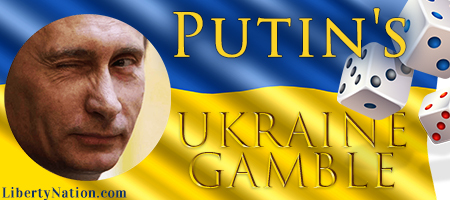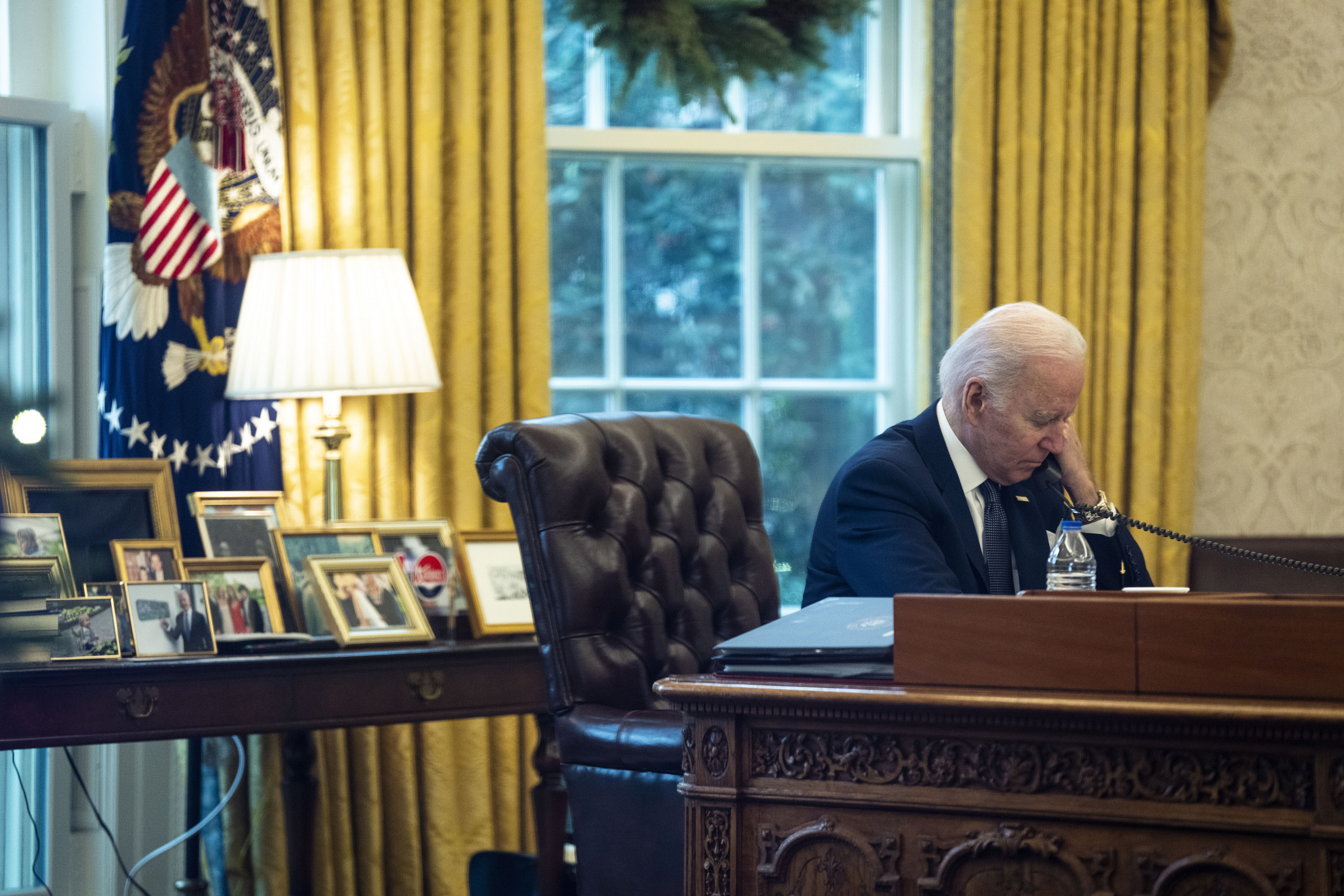In a concerted effort to develop a plan to de-escalate the crisis on Ukraine’s border, President Joe Biden spoke with Ukrainian president Volodymyr Zelensky yesterday afternoon. While there have been mixed reports on how the conversation went, it was billed by the White House as a “check-in” call. Press Secretary Jen Psaki said, “I would view this call as part of regular engagement with the Ukrainian government … This is more of a check-in call than it is about a specific announcement.” A White House statement explained:
“President Biden reaffirmed the readiness of the United States along with its allies and partners to respond decisively if Russia further invades Ukraine. He also underscored the commitment of the United States to Ukraine’s sovereignty and territorial integrity … and is exploring macroeconomic support to help Ukraine’s economy amidst pressure from Russia’s military build-up.”
 With President Biden’s confusing statements at his Jan. 19 press conference, clarity and reassurance of U.S. support are more critical now than ever.
With President Biden’s confusing statements at his Jan. 19 press conference, clarity and reassurance of U.S. support are more critical now than ever.
However, reports first published on CNN suggest the call was not a success. The news outlet quotes an anonymous senior Ukrainian official as saying the call “did not go well,” and that Biden had informed his counterpart that an invasion was “imminent.” Responding quickly to the report, National Security Council spokeswoman Emily Horne denied the wording and content, saying “Anonymous sources are ‘leaking’ falsehoods.” She continued:
“President Biden said that there is a distinct possibility that the Russians could invade Ukraine in February. He has said this publicly and we have been warning about this for months. Reports of anything more or different than that are completely false.”
Aggressive denials by the White House have some contending that CNN has removed reportage on this news, but as of publishing time, the outlet has not done so. It is notable that CNN and the Biden administration appear to be at odds with one another regarding the content of the phone call.
Between the two actors, some would consider it difficult to grant either side the “champion of truth” award.
Broadly Rejected Proposals
The call came after the U.S. State Department and NATO delivered individual responses to Moscow addressing the Kremlin’s demands for assurances Ukraine will not be given membership in NATO. Since neither response was shared with the press, it’s unclear whether each of the messages asserted the same intent. In the meantime, according to Bloomberg News, Russian President Putin’s government “is deliberating over the American response outlining ways to defuse the conflict.” The message coming from Moscow is that the Kremlin has “criticized proposals that broadly rejected its demands that the alliance close the door to Ukraine’s potential NATO membership and roll back forces from former Soviet states.”
A report by Australian AAP News Wire explained that the Kremlin believes the U.S. did not adequately address Moscow’s concerns. Putin’s spokesman Dmitry Peskov said, “Russia needed time to review the U.S. written response but U.S. and NATO statements that Russia’s main demands were unacceptable did not leave much room for optimism.” According to the AAP report, Peskov made a curious observation. “Based on what our colleagues said yesterday [January 27], it’s absolutely clear that on the main categories in those draft documents … we cannot say that our thoughts have been taken into account or that a willingness has been shown to take our concerns into account,” Peskov complained. But the documents by all accounts were not drafts. They were the final versions. He went on to suggest the situation in Europe was “reminiscent of the Cold War.” Interesting he should make the comparison since the former Soviet Union lost that engagement.

(Photo by Doug Mills-Pool/Getty Images)
Some viewed Russia’s lukewarm reaction to the U.S. letters as predictable, placing responsibility on the Biden administration’s failing credibility. Speaking with Fox News, Senator Tom Cotton (R-AR) said, “If you look at what happened in Afghanistan in August, with the nuclear negotiations with Iran, President Biden has been weak and passive with our adversaries. And that not surprisingly has emboldened our adversaries.”
Diplomatic Track
Looking to future talks focused on reducing tensions on Ukraine’s border, President Zelensky stated he welcomes additional discussions to be held in Berlin with diplomats from Russia, France, and Germany. As Reuters explained, “The President of Ukraine Volodymir Zelensky positively assesses the fact of the meeting, its constructive nature, as well as the intention to continue meaningful talks for two weeks in Berlin.” The Ukraine chief executive “welcomed” the diplomatic discussions as a worthwhile “step towards peace.” Additionally, as Fox News reported, the outlook by Ukrainian officials remains somewhat upbeat. Dmytro Kuleba, Ukraine’s foreign minister, offered that Russia might continue on the “diplomatic track” for at least two more weeks. However, according to Reuters, Kuleba lamented, “Nothing has changed. This is the bad news. Unfortunately, the biggest demand that Russia has is that Ukraine engages directly in talks with Russian proxies in Donetsk and Luhansk instead of negotiating with Russia. This will not happen; this is a matter of principle.”
As the window of opportunity remains open for talks among Ukraine, the U.S., NATO allies, and Russia, there is hope tensions will be reduced, and cooler heads will prevail. But the number of Russian military forces on the eastern Ukraine border is now estimated to be 127,000, and Moscow is carrying out extensive military exercises in Belarus a short distance from Kyiv. As a result, the West has just cause for worry.
The views expressed are those of the author and not of any other affiliation.
~ Read more from Dave Patterson.



